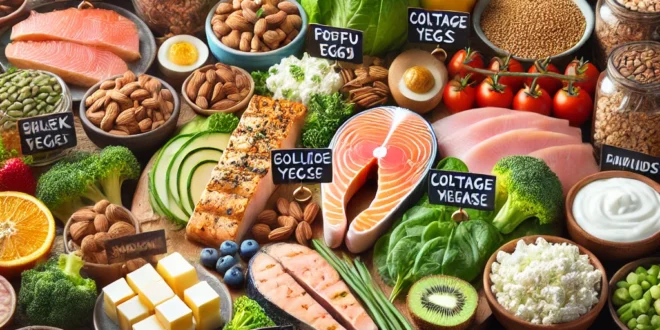21 Low Calorie, High Protein Foods to Supercharge Your Nutrition and Weight Loss Journey
Navigating the world of nutrition can be challenging, especially when you’re looking to maintain a healthy weight while ensuring your body gets the essential nutrients it needs. Protein is a crucial macronutrient that plays a vital role in muscle maintenance, metabolism, and overall health. This comprehensive guide will explore 21 incredible low-calorie, high-protein foods that can transform your diet and help you achieve your wellness goals.
Understanding Protein and Calorie Balance
Before diving into our list of nutritional powerhouses, it’s important to understand why low-calorie, high-protein foods are so beneficial. Protein is essential for numerous bodily functions, including muscle repair, immune system support, and hormone production. Moreover, it helps you feel fuller for longer, which can be a game-changer for weight management and reducing overall calorie intake.
Lean Protein Sources from the Animal Kingdom
1. Chicken Breast
A classic lean protein source, skinless chicken breast provides approximately 31 grams of protein per 100 grams while containing only about 165 calories. It’s incredibly versatile and can be prepared in numerous ways, making it a staple for health-conscious individuals.
2. Turkey Breast
Similar to chicken, turkey breast is an excellent low-calorie protein option. With around 29 grams of protein per 100 grams and only 150 calories, it’s a nutritional powerhouse that supports muscle maintenance and weight loss efforts.
3. Egg Whites
For those looking to maximize protein while minimizing calories, egg whites are an exceptional choice. One large egg white contains approximately 3.6 grams of protein and only 17 calories, making it an ideal ingredient for protein-packed meals.
Seafood Options with High Protein Content
4. Tuna
Canned or fresh, tuna is a nutritional powerhouse. A 100-gram serving provides around 30 grams of protein and only 130 calories. Rich in omega-3 fatty acids, tuna offers additional health benefits beyond its protein content.
5. Shrimp
Often overlooked, shrimp is a low-calorie protein source that delivers approximately 24 grams of protein per 100 grams with just 99 calories. Its low-fat content makes it an excellent choice for those monitoring their calorie intake.
Plant-Based Protein Alternatives
6. Tofu
A versatile plant-based protein, tofu provides about 8 grams of protein per 100 grams and only 76 calories. Its ability to absorb flavors makes it an excellent meat substitute for vegetarians and vegans.
7. Edamame
These young soybeans are nutritional gems, offering 11 grams of protein per 100 grams and just 122 calories. They’re also packed with fiber and essential minerals, making them a well-rounded food choice.
Dairy and Dairy Alternatives
8. Greek Yogurt
Non-fat Greek yogurt stands out with approximately 17 grams of protein per 170-gram serving and only 100 calories. Its probiotic content also supports digestive health, making it a nutritional multitasker.
9. Cottage Cheese
Low-fat cottage cheese provides around 28 grams of protein per cup and just 163 calories. Its creamy texture and high protein content make it an excellent addition to both sweet and savory dishes.
Legumes and Beans
10. Lentils
These nutrient-dense legumes offer 9 grams of protein per half-cup and only 115 calories. They’re also rich in fiber and various essential minerals, supporting overall health and sustained energy.
11. Black Beans
With approximately 8 grams of protein per half-cup and 114 calories, black beans are a fantastic plant-based protein source. They’re also high in fiber and can help regulate blood sugar levels.
Additional Protein-Rich Options
12-21. Quick Protein Picks
Our list continues with additional options like quinoa, tempeh, canned sardines, chicken or turkey sausage, protein powders, seitan, and protein-enriched foods like certain breads and cereals. Each offers unique nutritional benefits and can be incorporated into a balanced diet.
Meal Planning and Protein Integration Strategies
Successfully incorporating these low-calorie, high-protein foods requires strategic meal planning. Consider preparing meals in advance, experimenting with different cooking methods, and mixing protein sources to ensure variety and nutritional balance.
Conclusion: Your Path to Nutritional Excellence
By strategically including these 21 low-calorie, high-protein foods in your diet, you can support weight management, muscle maintenance, and overall health. Remember, nutrition is not about restriction but about making informed, delicious choices that nourish your body.
Always consult with a registered dietitian or healthcare professional before making significant dietary changes, especially if you have specific health conditions or nutritional requirements.
 Good Calories Guide GoodCalories Guide focuses on nutrition, healthy eating, and overall wellness. The site offers practical insights into evidence-based dietary practices, including tips for specific lifestyles such as veganism, keto, and family-friendly meal planning. It also addresses unique nutritional needs for individuals with conditions like diabetes or food allergies, while providing quick and accessible recipes to make healthy living a sustainable and enjoyable choice.
Good Calories Guide GoodCalories Guide focuses on nutrition, healthy eating, and overall wellness. The site offers practical insights into evidence-based dietary practices, including tips for specific lifestyles such as veganism, keto, and family-friendly meal planning. It also addresses unique nutritional needs for individuals with conditions like diabetes or food allergies, while providing quick and accessible recipes to make healthy living a sustainable and enjoyable choice.


